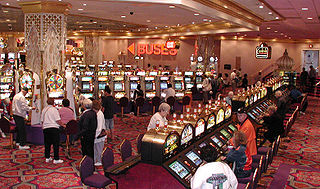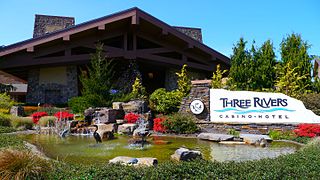Video bingo, or electronic bingo machine, is a type of slot machine or amusement-with-prize machine (AWP) which instead of the typical reel-style game play, one or more bingo cards can be played on the machine.
Video bingo machines come in both Class II and Class III formats, [1] and it is not a reference to the Class II bingo machine which refers to the software legality. [2] Because, it is not exclusive to Class II gaming it is sometimes referred to as a theme game among slot manufacturers.
Video bingo machines in casinos in the United States are regulated by state or Indian gaming agencies. Since video bingo machines are available in Class II and Class III formats, they are subject to the Indian Gaming Regulatory Act. [2] Also, the exploitation and licensing of the video bingo machines are regulated separately by local state law. According to the Louisiana Chapter RS 4:724, Video Bingo machines are available to the public, and these machines should meet the list of requirements to prize size, license type and locations allowed for placement. [3] According to legislation of North Carolina Video Poker and Video Bingo machines became illegal as of July 1, 2007. It is prohibited also to store and manufacture such machines at the state territory. [4]
Slot manufacturers operating in the United States which sell video bingo slot machines include Zitro . [5] [6]

A slot machine, fruit machine, poker machine or pokies is a gambling machine that creates a game of chance for its customers. Slot machines are also known pejoratively as one-armed bandits, alluding to the large mechanical levers affixed to the sides of early mechanical machines, and to the games' ability to empty players' pockets and wallets as thieves would.

Native American gaming comprises casinos, bingo halls, and other gambling operations on Indian reservations or other tribal lands in the United States. Because these areas have tribal sovereignty, states have limited ability to forbid gambling there, as codified by the Indian Gaming Regulatory Act of 1988. As of 2011, there were 460 gambling operations run by 240 tribes, with a total annual revenue of $27 billion.

In the United States and Canada, bingo is a game of chance in which each player matches the numbers printed in different arrangements on cards. The game host draws balls at random, marking the selected numbers with tiles. When a player finds that the selected numbers are arranged on their card in a horizontal, vertical, or diagonal line, they call out "Bingo!" to alert all participants to a winning card, which prompts the game host to examine the card for verification of the win. Players compete against one another to be the first to have a winning arrangement for the prize or jackpot. After a winner is declared, the players clear their number cards of the tiles and the game host begins a new round of play.
Online casinos, also known as virtual casinos or Internet casinos, are online versions of traditional casinos. Online casinos enable gamblers to play and wager on casino games through the Internet. It is a prolific form of online gambling.
Seminole Tribe of Florida v. Florida, 517 U.S. 44 (1996), was a United States Supreme Court case which held that Article One of the U.S. Constitution did not give the United States Congress the power to abrogate the sovereign immunity of the states that is further protected under the Eleventh Amendment. Such abrogation is permitted where it is necessary to enforce the rights of citizens guaranteed under the Fourteenth Amendment as per Fitzpatrick v. Bitzer. The case also held that the doctrine of Ex parte Young, which allows state officials to be sued in their official capacity for prospective injunctive relief, was inapplicable under these circumstances, because any remedy was limited to the one that Congress had provided.
A video lottery terminal (VLT), also sometimes known as a video gaming terminal (VGT), video slots, or the video lottery, is a type of electronic gambling machine. They are typically operated by a region's lottery, and situated at licensed establishments such as bars and restaurants.
The Lytton Band of Pomo Indians is a federally recognized tribe of Pomo Native Americans. They were recognized in the late 1980s, as lineal descendants of the two families who lived at the Lytton Rancheria in Healdsburg, California from 1937 to about 1960. The tribe now has around 275 enrolled members. It has a casino in San Pablo, California, and has proposed to build housing for tribe members, plus a winery and a hotel, just west of Windsor, California, in Sonoma County.

The Indian Gaming Regulatory Act is a 1988 United States federal law that establishes the jurisdictional framework that governs Indian gaming. There was no federal gaming structure before this act. The stated purposes of the act include providing a legislative basis for the operation/regulation of Indian gaming, protecting gaming as a means of generating revenue for the tribes, encouraging economic development of these tribes, and protecting the enterprises from negative influences. The law established the National Indian Gaming Commission and gave it a regulatory mandate. The law also delegated new authority to the U.S. Department of the Interior and created new federal offenses, giving the U.S. Department of Justice authority to prosecute them.

In the United States, gambling is subject to a variety of legal restrictions. In 2008, gambling activities generated gross revenues of $92.27 billion in the United States.
A gaming control board (GCB), also called by various names including gambling control board, casino control board, gambling board, and gaming commission, is a government agency charged with regulating casino and other types of gaming in a defined geographical area, usually a state, and of enforcing gaming law in general.
Choctaw Casino Bingo in Durant, Oklahoma was the first Choctaw casino to be constructed, in 1987, and was also the original casino before the construction of new Choctaw Casino Resort in 2005. Since the construction of the original casino, it has since then sparked growth for the Choctaw gaming industry.
California v. Cabazon Band of Mission Indians, 480 U.S. 202 (1987), was a United States Supreme Court case involving the development of Native American gaming. The Supreme Court's decision effectively overturned the existing laws restricting gaming/gambling on U.S. Indian reservations.

Gambling in Oregon relates to the laws, regulations, and authorized forms of gambling.
Gambling in Pennsylvania includes casino gambling, the Pennsylvania Lottery, horse racing, bingo, and small games of chance conducted by nonprofit organizations and taverns under limited circumstances. Although casino gaming has been legal for less than two decades, Pennsylvania is second only to Nevada in commercial casino revenues.

Slot machine terminology, characteristics and regulations vary around the world.
Legal forms of gambling in the U.S. state of North Carolina include the North Carolina Education Lottery, three Indian casinos, charitable bingo and raffles, and low-stakes "beach bingo". North Carolina has long resisted expansion of gambling, owing to its conservative Bible Belt culture.
Legal forms of gambling in the U.S. state of Texas include the Texas Lottery; parimutuel wagering on horse and greyhound racing; limited charitable bingo, limited charitable raffles, and three Native American casinos. Other forms of gambling are illegal in Texas.

Ortiz Gaming is a multinational company specializing in Class II and Class III video bingo slot machines.
Legal forms of gambling in the U.S. state of Massachusetts include casinos, sports betting, parimutuel wagering on horse racing, the Massachusetts Lottery, and charitable gaming. The Massachusetts Gaming Commission regulates commercial operations under state jurisdiction.
Legal forms of gambling in the U.S. state of Maine include parimutuel wagering on horse races, sports betting, the Maine Lottery, two casinos, and charitable gaming.